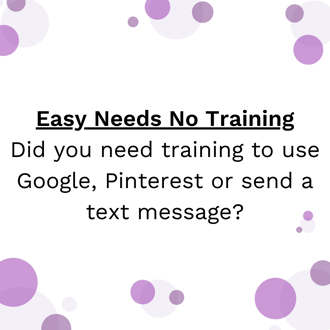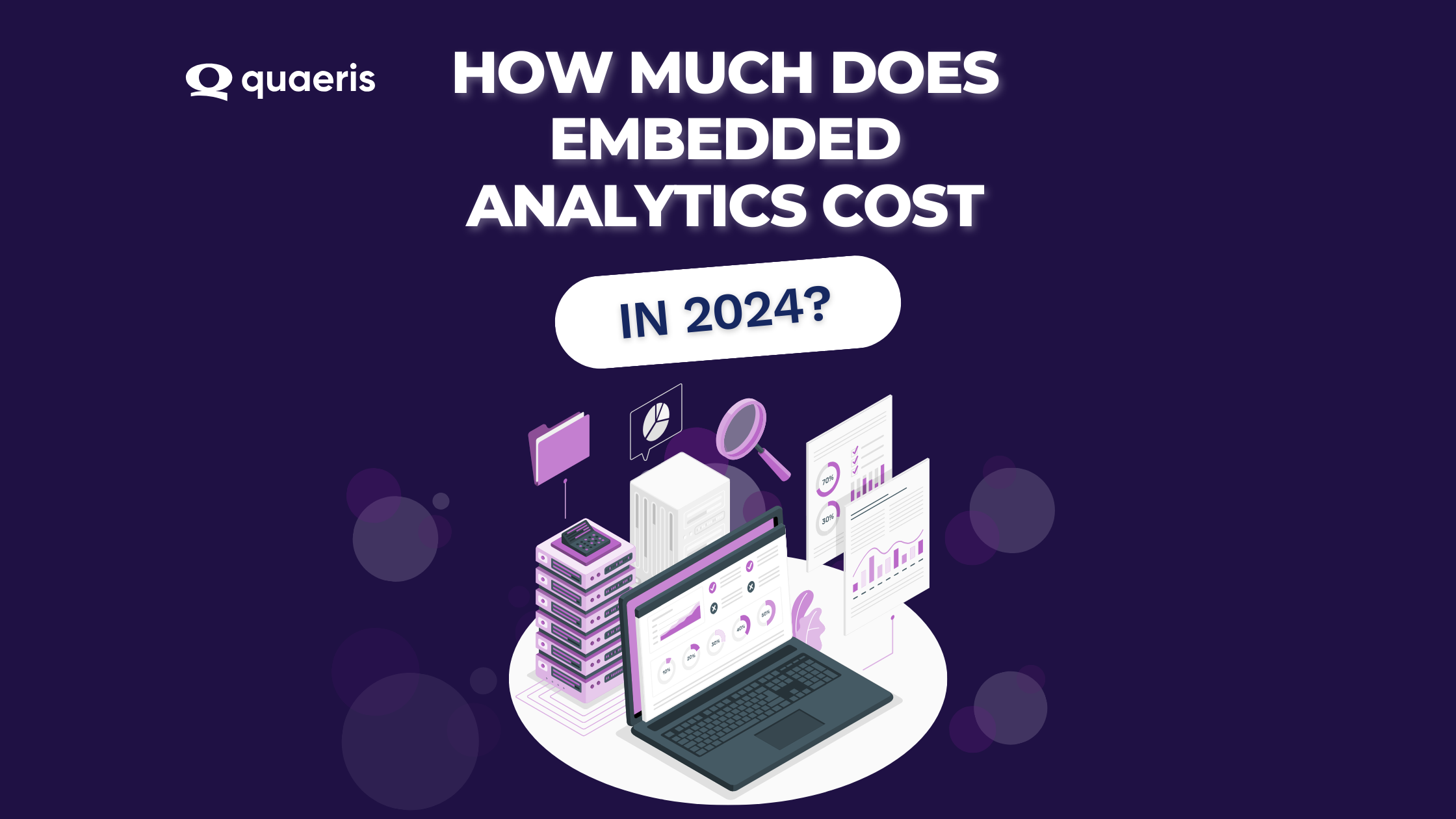11 Reasons to Start Using Natural Language Query
Technology is advancing all the time. For decades, Microsoft's Power BI and Tableau have been at the forefront. Few advancements have challenged these tech giants. But the future is here with natural language queries (NLQ). NLQ makes it possible for nontechnical users to dive into their data and resurface with actionable insights. Gone are the days for the nontechnical user to wait for the data analysts to get around to putting together a dashboard for ad hoc questions. No longer does the sales manager or operations lead need to be an expert in coding SQL queries or understand how a database works
Natural language query is the next big thing for companies that use analytics to understand their customers and market. When it comes to making changes, it's important to make sure you're making the right ones for your business. NLQ isn't simply another way to search through your data—it's a better way – and it complements and enhances your current analytics and BI.
It can feel overwhelming to make changes to your organization.
While there are many advantages to using natural language queries, you may be hesitant that your current tools will be replaced by something new and unfamiliar. Regardless of how you feel about your current tool, you’ve worked with them for years; you know how they work, and you even understand their shortcomings. Taking the time to learn a new tool is time intensive in a world where time is money. By using NQL, this is far from true! Using natural language is innate to us. Seeing it in action with your data takes but a handful of tries to master! You will find the time and You will find the time and value equation is very high with a good NLQ solution.
If you've already built an analytics platform from scratch or invested heavily in a toolset, consider how much time and money would be required for you to adopt something else. How effective would those new solutions be at solving real problems within your team? Here are 10 reasons why you should start using natural language queries right now.
1. Initiative data search
Natural language query (NLQ) is a form of Artificial Intelligence (AI). In one sense we use NLQ every day when we use the Google search engine. Advances in AI have enabled the use of NLQ on structured corporate data.
Unlike regular SQL queries which requires human-readable code like “SELECT * FROM table WHERE column = value”, NLQ uses natural language expressions such as “What is patients with diabetes and live in California” or “Show sales by customer by product by city”. A great tool that demonstrates this ability is Quaeris. It is a natural language search driven analytical tool that empowers everyone with data insights.The power of Quaeris is its ability to layer on top of any structured dataset. Its implementation process is quick and rollout to 100s of users at once is easy and it happens all within a matter of hours This is possible because of artificial intelligence and the fact that it does not rely on people to build and use.
2. Optimize and streamline your analytics process
Now that we’ve determined the benefits of creating a data strategy with natural language queries, let’s dive into how to put it into action! There are two simple approaches here, NLQ the old and manual way, or leverage AI. Let’s compare:
|
|
AI Build and AI driven |
Manual Build |
|
Build of NLQ model |
AI – done in hours |
Can take weeks/months |
|
Ability to ask questions |
Context is enough |
Language has to match! |
|
Presentation of Answers |
AI driven – suggested analytics based on questions and data |
Only the pre-defined results show up |
|
Recommendations |
Yes, heuristically presented |
None/manually built |
|
Implementation Time |
Hours |
Weeks/months |
|
Products in the market |
Quaeris |
Many |
3. Find what you need, how you need it
NLQ is a great way to “Google” your data and find what you need. Use natural language phrases and get instant results in the form of a chart/graph or number. Instead of a keyword search-based approach that expects you to type each keyword (“2022” + “sales”+ “product”) and then execute the query, Quaeris’ natural language allows you to ask “What’re the sales by product for 2022”. What sets Quaeris’ mobile processes apart from other keyword-based programs is the simplicity and ease of voice-to-text. Just speak into your phone’s mic and get the results instantly.
But how does it understand the context of my queries? That’s the beauty of Quaeris. It’s programmed to understand context, like a normal human conversation. For instance, if you type ”products” in the search bar, Quaeris will offer you five different contextual answers pertaining to ‘Product’. How efficient! This puts rocket boosters to your data exploration efforts.
This means that if you're looking for "aardvarks" but don't know the exact spelling, you can type in "I want to see all aardvark records where..." and then fill in the blank with something like "has pictures". Another example would be if someone asks: “What was our most popular product last year?” You could simply type this question into an NLQ query and get exactly what they're looking for!
4. Self-service analytics
NLQ is not just about getting insights quickly, it is about helping you understand your business. The more you know about your data, the better the decisions you make for your business.
Why? Because we humans are slaves of context – we always want to know not just what we are looking for but we always want to know what else and other adjacent data elements. That is what the advanced AI of Quaeris allows you to do.
While this may seem obvious, it's important to remember that just because our data contains information about a customer doesn't mean we have insight into their behavior or preferences. With NLQ, we can explore content and context and make inferences about our customers' needs and wants, directionality, and understanding how best to serve them. Knowing their behaviors identifies opportunities for cross-sells, upsells retention etc.
5. Improve your sales and marketing execution
You have your north star, your strategy and it now comes down to execution and tracking the KPIs. Managing a complex business requires you to be agile – agile in framing questions about the business, agile in making quick tactical decisions, and agile in communicating and tracking the decision.
With Quaeris’ Recommendation Engine, you not only get instant answers to your questions but also get insights on what you are ‘not’ looking for – often the pitfalls are in totally new areas that you are not tracking. As a result, not only you, but your entire team is able to track outcomes and keep an eye on potential pitfalls.
6. Save time on the data discovery process
NLQ can be used to save time by reducing the number of steps needed to get insights. NLQ allows you to do more complicated searches, faster. What is unique about Quaeris’ AI, is that it will shine a light on “dark data” – the questions you are not asking! How does Quaeris do it – just the same way Netflix recommends shows that you may be interested in watching or how Amazon.com shows you products that you were not even searching for but needed!
If you are an analyst and you have a hunch about why the sales of a product went down – just imagine how quickly you can zero down on issues that matter as opposed to relying on your BI team to answer every simple question that you may have! Or if you are a researcher who uses data from various sources, NLQ could help reduce your workload as well as increase your productivity because it enables you to search and collaborate on data quickly thus making your research time more efficient. saving from different sources at once instead of one after another; this saves time since there will be fewer time intervals between each search query run through conventional methods like keyword matching.
7. Extend your budget in every department
You may be wondering how NLQ can save you money. Research has shown that the real cost of dashboards is NOT in licensing fees, but in the cost of people, cloud data storage, and in computing As a result, each dashboard costs about $18,000 to 20,000.
What if you did not need to build dashboards? What if users could get their answers without having to resort to the analytics team? Every analyst knows the process of shuffling through an exhaustive number of dashboards, thumbing through a grueling amount of dashboard pages to finally numbly staring at every one of the 360+ data elements looking for an answer. With Quaeris, that process is over, just type your question and go! Save your team hours of frustration!
Also, Quaeris is lightweight, so it offers unlimited user licenses – that means no approvals are needed each time you have to give a license to a new colleague. Much easier and cheaper to roll out.
8. Increase productivity company-wide
In a recent survey done in collaboration with Eckerson Group, 33% of people cited ‘Ease of use’ as a big reason for not using dashboards – meaning 1/3 of your users do not find data use intuitive.
NLQ is similar to our natural spoken language, so it is easy for anyone to learn, including your fresh MBA grads, supply chain, and finance users, sales and field users, or any other non-technical staff who need access to data in order to perform their jobs. Natural language querying can be achieved without the need for training or experience with programming languages like SQL or Python!
Imagine if insights were accessible to everyone in your organization, what could your company accomplish?!
9. Grow your business’ data adoption

Data adoption is the process of getting users to use data in their day-to-day work. It includes three main areas:
- Making sure the data is available and accessible when people need it
- Teaching people how to access and use data
It’s important to note that data usability is not the same thing as user-friendliness. In fact, many of the approaches to making data more usable aren’t necessarily appealing to end users. Instead, they make it easier for people who work with data every day—data analysts and managers—to use that data effectively.
10. A better way to run your organization
The final reason why you should start using NLQ is that it’s a better way to run your organization. As we’ve discussed, NLQ allows you to make quick and informed decisions. When you keep your data in one place, you’re able to track and present your data in an easy-to-digest format. This process will help your company become more efficient. By streamlining the way you work with data, make sure nothing falls through the cracks.
11. Creating Human-Like Text with GPT Language Models
GPT language models, or Generative Pre-trained Transformer models, are advanced machine learning models that can generate text that is almost indistinguishable from text written by a human. These models are pre-trained on vast amounts of text data and use deep learning techniques to learn patterns in language and generate coherent, human-like text.
Quaeris provides users with a user-friendly interface where they can input a prompt or a topic, and the platform's GPT language model will generate high-quality content that is optimized for the user's intended audience. The resulting text is human-like and can be used as-is or edited to fit the user's specific needs.
Natural language query is the way of the future.
NLQ is the future of data analytics. While there are many reasons to use natural language queries, the most important reason is to make searching easier. It's a more natural way of interacting with your data, and it's only going to become more ubiquitous. More and more consumers are beginning to expect their queries to be answered in English, not by code. Natural language query allows users to search for information without having to know exactly what they want.
 By
By


